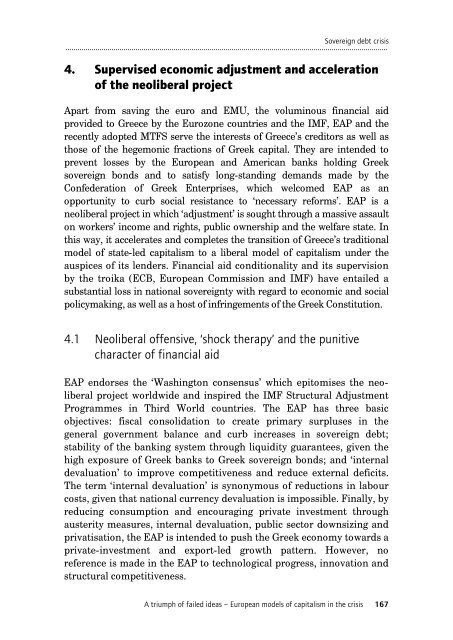A triumph of failed ideas European models of capitalism in ... - Journal
A triumph of failed ideas European models of capitalism in ... - Journal
A triumph of failed ideas European models of capitalism in ... - Journal
Create successful ePaper yourself
Turn your PDF publications into a flip-book with our unique Google optimized e-Paper software.
Sovereign debt crisis.................................................................................................................................................................4. Supervised economic adjustment and acceleration<strong>of</strong> the neoliberal projectApart from sav<strong>in</strong>g the euro and EMU, the volum<strong>in</strong>ous f<strong>in</strong>ancial aidprovided to Greece by the Eurozone countries and the IMF, EAP and therecently adopted MTFS serve the <strong>in</strong>terests <strong>of</strong> Greece’s creditors as well asthose <strong>of</strong> the hegemonic fractions <strong>of</strong> Greek capital. They are <strong>in</strong>tended toprevent losses by the <strong>European</strong> and American banks hold<strong>in</strong>g Greeksovereign bonds and to satisfy long-stand<strong>in</strong>g demands made by theConfederation <strong>of</strong> Greek Enterprises, which welcomed EAP as anopportunity to curb social resistance to ‘necessary reforms’. EAP is aneoliberal project <strong>in</strong> which ‘adjustment’ is sought through a massive assaulton workers’ <strong>in</strong>come and rights, public ownership and the welfare state. Inthis way, it accelerates and completes the transition <strong>of</strong> Greece’s traditionalmodel <strong>of</strong> state-led <strong>capitalism</strong> to a liberal model <strong>of</strong> <strong>capitalism</strong> under theauspices <strong>of</strong> its lenders. F<strong>in</strong>ancial aid conditionality and its supervisionby the troika (ECB, <strong>European</strong> Commission and IMF) have entailed asubstantial loss <strong>in</strong> national sovereignty with regard to economic and socialpolicymak<strong>in</strong>g, as well as a host <strong>of</strong> <strong>in</strong>fr<strong>in</strong>gements <strong>of</strong> the Greek Constitution.4.1 Neoliberal <strong>of</strong>fensive, ‘shock therapy’ and the punitivecharacter <strong>of</strong> f<strong>in</strong>ancial aidEAP endorses the ‘Wash<strong>in</strong>gton consensus’ which epitomises the neoliberalproject worldwide and <strong>in</strong>spired the IMF Structural AdjustmentProgrammes <strong>in</strong> Third World countries. The EAP has three basicobjectives: fiscal consolidation to create primary surpluses <strong>in</strong> thegeneral government balance and curb <strong>in</strong>creases <strong>in</strong> sovereign debt;stability <strong>of</strong> the bank<strong>in</strong>g system through liquidity guarantees, given thehigh exposure <strong>of</strong> Greek banks to Greek sovereign bonds; and ‘<strong>in</strong>ternaldevaluation’ to improve competitiveness and reduce external deficits.The term ‘<strong>in</strong>ternal devaluation’ is synonymous <strong>of</strong> reductions <strong>in</strong> labourcosts, given that national currency devaluation is impossible. F<strong>in</strong>ally, byreduc<strong>in</strong>g consumption and encourag<strong>in</strong>g private <strong>in</strong>vestment throughausterity measures, <strong>in</strong>ternal devaluation, public sector downsiz<strong>in</strong>g andprivatisation, the EAP is <strong>in</strong>tended to push the Greek economy towards aprivate-<strong>in</strong>vestment and export-led growth pattern. However, noreference is made <strong>in</strong> the EAP to technological progress, <strong>in</strong>novation andstructural competitiveness.A <strong>triumph</strong> <strong>of</strong> <strong>failed</strong> <strong>ideas</strong> – <strong>European</strong> <strong>models</strong> <strong>of</strong> <strong>capitalism</strong> <strong>in</strong> the crisis 167








